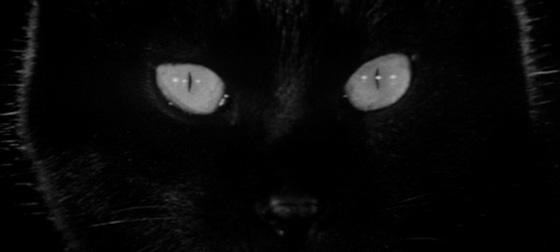
Kuroneko (Black Cat) (Movie Review)
In "Kuroneko", a woman and her daughter-in-law are raped and murdered by a roving band of samurai. After their death the woman and her daughter-in-law swear their loyalty to the devil in order for them to be able to return to the world as cat-like ghosts and kill every samurai they possibly can. They then lure unsuspecting samurai to their home, deep in a bamboo forest, where the daughter-in-law proceeds to get the samurai drunk and seduce them. When the samurai are at their most vulnerable the mother and daughter-in-law reveal their true forms and kill them.
Meanwhile the woman’s son Gintoki, who is also the daughter-in-law’s husband, goes away to war and becomes a hero, more or less by accident. The leader of an opposing army tries to kill him, but as he tries to attack his comically large club becomes stuck in some reeds, missing Gintoki completely, who up until that moment had been running away the whole fight, and allowing the son to kill him. Gintoki is made a samurai and as his first duty as a full-fledged samurai and (supposed) great warrior he is to kill the demons in the bamboo forest. When he finds out that the ghosts are his mother and his wife he is forced to choose between his duty as a samurai and his family. Gintoki’s family is forced to choose between their raging blood-lust for all things samurai and their love for Gintoki. The choices they make are painful because failure to honor their duty will cost them everything.
I really enjoy samurai movies, so for me, horror movies about samurai are definitely a winning combination. They're great because they are often nuanced films about conflicting ideals more than just simple protagonist vs antagonist action movies. "Kuroneko" is thematically-similar with other samurai movies like “Sword of the Beast,” and “Harakiri,” but provide this type of story with a horror back-drop and a wonderful dreamlike atmosphere, instead of with extended sequences of sword-fighting.
As "Kuroneko" goes on, the value of the status of being a samurai is questioned as Gintoki becomes one, more out of blind luck than bravery, while his comrades lie dead in a rice-paddy. His burden of being a widower who hunts ghosts every night is contrasted with his honor-less, lazy, and undignified lord who spends all day doing nothing but eating, drinking, and lying around with women who are either prostitutes or concubines.
In samurai movies like "Kuroneko" the desire to live the supposedly glamorous samurai lifestyle is juxtaposed with the inevitable evil that accompanies a violent existence of killing and pillaging. The ultimate lesson is that It is impossible to walk both a path of honor and violence because these two things are incompatible.
I was excited about this movie when I found out it was made by Kaneto Shindo, who also directed one of my all-time favorite horror movies, "Onibaba". These movies are thematically similar in that that they are both anti-war, anti-samurai movies, but "Kuroneko" doesn’t have the same serious heft to it as "Onibaba". However, "Kuroneko" does have a wonderful dream-like atmosphere which makes it a solid movie and well worth watching. If you are into Japanese horror movies I would say this is definitely one to check out, but if you are unfamiliar with the subgenre, this is probably not the best one to start with.

